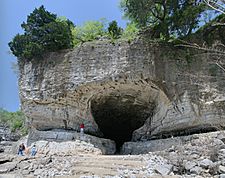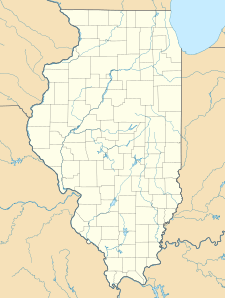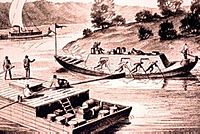Cave-in-Rock State Park facts for kids
Quick facts for kids Cave-In-Rock State Park |
|
|---|---|
|
IUCN Category III (Natural Monument)
|
|
 |
|
| Location | Hardin County, Illinois, U.S. |
| Nearest city | Elizabethtown, Illinois |
| Area | 204 acres (83 ha) |
| Established | 1929 |
| Governing body | Illinois Department of Natural Resources |
|
Cave-In-Rock
|
|
| Location | 0.5 mi N of the town of Cave-In-Rock, Cave-In-Rock, Illinois |
| Area | less than one acre |
| MPS | Caught in the Middle: The Civil War on the Lower Ohio River MPS |
| NRHP reference No. | 98000984 |
| Added to NRHP | August 6, 1998 |
Cave-In-Rock State Park is a special park in Illinois. It covers about 240 acres. You can find it in the town of Cave-in-Rock, in Hardin County, Illinois, U.S.. The park is home to the famous Cave-In-Rock. This cave is a well-known spot along the Ohio River. The Illinois Department of Natural Resources (IDNR) takes care of the park.
Contents
How the Cave Was Formed
The main feature of the park is a huge cave. It is about 55-foot (17 m) wide. This cave was carved into the limestone cliffs by strong winds and water. Big events like the 1811–12 New Madrid earthquakes also helped shape it. Floods from melting glaciers after the Wisconsin Ice Age wore away the rock. Unlike some other caves, this one is a tunnel. It was eroded into the bluff, not formed by typical underground water processes.
A Look Back in Time
Early Use of the Cave
For thousands of years, Native Americans knew about and used Cave-in-Rock. The first European to find the cave was M. de Lery from France. In 1729, he mapped it. He named it "caverne dans Le Roc". This means "cave in the rock" in English. That's how the cave got its name today. People also called it Rock-In-Cave, House of Nature, or Big Cave.
River History and Outlaws
In the late 1700s and early 1800s, Cave-in-Rock became very famous. Flatboats carried farm goods down the Ohio River. They were going to sell them in New Orleans. The cave was a known landmark on this journey. But it was also a dangerous place. From about 1797 to 1799, the cave was a hideout. A group of outlaws led by Samuel Mason used it. They would target the boats traveling on the river. Later, famous outlaws Frank and Jesse James also supposedly hid here. Local stories say they left their marks in the cave.
Settlement and the Ferry
Later in the 1800s, settlers made the area safer. They built the town of Cave-In-Rock, Illinois near the cave. This town is still there today. A ferry now crosses the Ohio River from the park. It connects Illinois Route 1 to Kentucky Route 91. The cave has been part of Illinois' Cave-in-Rock State Park since 1929.
Becoming a State Park
When steamboats started traveling the Ohio River in the 1810s, more people visited the cave. Artists like Karl Bodmer came to see it. Cave-in-Rock became a popular spot for river tourism. In 1929, the state of Illinois bought 64.5 acres of land, including the cave. More land was added later to make the park bigger. The park goes from the river's edge to the top of a 60-foot-tall (18 m) cliff. The IDNR takes care of the park. Visitors can enjoy river access, camping, and hiking. You can also hike to the historic cave itself.
Cave-in-Rock in Movies and TV
The cave has been featured in several movies and TV shows.
- Walt Disney Productions used the site in 1956. It was for the Davy Crockett adventure, Davy Crockett and the River Pirates. The movie shows Davy Crockett and his friends fighting river outlaws at the cave.
- In 1962, the big Western film How the West Was Won also featured the cave.
- The 1999 In Search of History series had an episode called "River Pirates". This documentary talked about the early river outlaws. It included the famous Cave-in-Rock.
 | John T. Biggers |
 | Thomas Blackshear |
 | Mark Bradford |
 | Beverly Buchanan |





